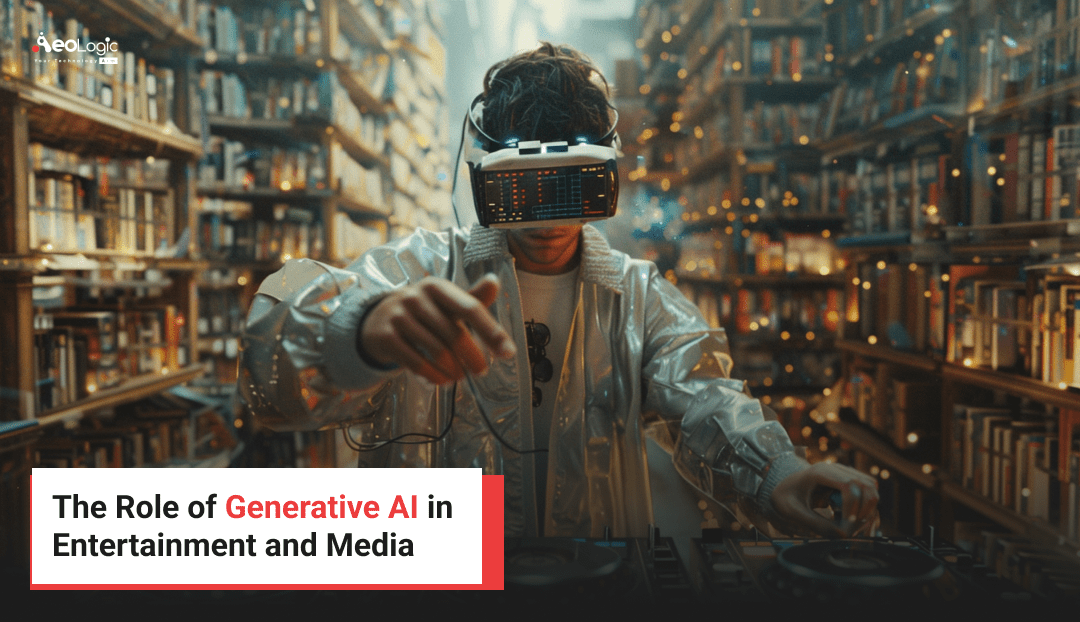The entertainment and media industries are the sectors that have been revolutionized by generative AI. The traditional ways of enhancing the entertainment and media industry often hinder innovation and crispness that everyone expects in an evolving time.
The expectations are high but the entertainment and media organizations are not able to deliver such content that fulfills the expectations. Where generative AI in entertainment and media provides ways and techniques that overall enhance and boost how content is created, distributed, and consumed by the audience.
Generative AI solutions are revolutionizing media and entertainment by automating content production, enabling individualized experiences, and maximizing audience engagement. The industry may improve marketing and promotion, produce more immersive and customized content, and instantly assess audience behavior by utilizing AI.
More user pleasure and loyalty result from this, which eventually makes the media ecosystem more responsive and dynamic. Overall, the generative AI in entertainment and media can calculate every possibility that could provide more enhanced, unique, and innovative content to attract viewers or audiences.
Generative AI in Media and Entertainment Market Growth
The generative AI in the media and entertainment market has grown exponentially in recent years. It will grow from $1.97 billion in 2024 to $2.53 billion in 2025 at a compound annual growth rate (CAGR) of 28.1%. The generative AI in the media and entertainment market size is expected to see exponential growth in the next few years. It will grow to $6.73 billion in 2029 at a compound annual growth rate (CAGR) of 27.8%.
A significant portion of media and entertainment organizations (83%) have successfully transformed a generative AI use case into production within six months. A substantial percentage of media and entertainment executives (64%) have already moved generative AI use cases into production. A survey of entertainment workers in the U.S. found that 51% believed generative AI can be effective in creating sound effects for film, TV, or games.
A global survey of business decision-makers from the media and entertainment field in September 2024 reveals that the most common way of sourcing GenAI models in their operations is by collaborating with content production partners to build or integrate such models in-house.
However, 33% of respondents said they were using pre-trained commercial models for image, audio, and video generation. About 40% of respondents claimed that they used GenAI technology to assist in character and environment design tasks.
84% of advertising executives and 61% of consumers surveyed in the United States stated they would be most likely to engage with or utilize generative artificial intelligence (AI) for advertisements on social media. In comparison, 32% of advertising executives and 18% of consumers indicated they would utilize print media.
Explore more: How Generative AI is Revolutionizing Industries
The Role of Generative AI for Entertainment and Media
Generative AI is a type of AI that has more advanced potential than traditional AI. Generative AI in entertainment and media can be used to create original content like images, music, and text. Simply the generative AI is the solution to saving the extinction of entertainment and media industries.
Generative AI can enable media and entertainment managers to create new and unique content with its incredible potential. The media and entertainment industry are running out of ideas as generative AI powers various use cases again alive the spark. The benefits and use cases involve content localization, personalization, digital character development, automation, and immersive experience for the audience.
Also Read: Role of Generative AI Solutions for Business Growth
Generative AI Use Cases in Entertainment and Media
Generative AI in entertainment and media offers numerous use cases as here are the top use cases mentioned below.

1) Content Localization
In the media and entertainment industry, language could be a barrier for various regions. But with generative AI in entertainment and media, it is possible to enable content localization to convert any specific language content into other forms of languages.
Simply, content localization involves various processes or services like translating text, creating dialogues, writing instructions, and providing localized voiceovers, among other services. This overall enhances the reach of content at the global level.
It transforms the content distribution industry by providing a variety of advantages, including:
- It facilitates the localization of content for global audiences, which is beneficial to film and production studios.
- It facilitates the creation of content summaries.
- It reduces the necessity for manual transcriptions by transcribing spoken content into written words in real-time.
- Automates the encoding process and generates subtitles in a variety of languages to ensure that the content is accessible to a global audience.
For example, Scott Man, co-founder and Hollywood director of the Flawless company, uses Generative AI to dub movies into different languages.
The tool could match the voice of the character and make a natural dub in other languages.
Making the dubbing process better and helping the production team is possible with Microsoft Voice fonts. These add sounds to the video.
Also Read: The Role of Generative AI Consulting Services in AI Adoption
2) Digital Avatars And Characters
Hiring different professional actors and real-world characters can be costly for the entertainment and media industry. The generative AI in the entertainment and media industry can generate virtual avatars and characters the same as real ones. This reduces the extra expenses to hire professional actors and characters. These digital characters and avatars can be used in movies, games, and virtual experiences.
3) Audiobook Generation
There are various aspects like audiobook publishers that face many issues like hiring of vocal artists, scriptwriters. Publishers may be able to release audiobooks without the time and cost of hiring human voice actors thanks to generative AI-powered text-to-speech technology. When looking for the ideal voice to narrate their books, authors may have additional possibilities thanks to this technology.
4) Personalized and Automated Marketing
Marketing is a very important aspect of the entertainment and media industry as the more popularity, the more people will engage with them. The generative AI in the entertainment and media industry enables analysis of customers’ preferences, behaviors, etc to provide personalized marketing. This also enables simple email service to send individual advertising emails to each customer according to their likes and dislikes.
Also read: Use Cases of Generative AI in Enhancing Customer Experience
5) In-game Item Generation
The gaming industry is also involved in the entertainment industry as the advanced games need to develop in-game items such as customers, gears, characters, etc. The manual development takes too much time and effort. Where generative AI in the entertainment and media industry can simply develop these items just by providing the right prompt. This helps game developers to provide innovative ideas to keep games interesting for the players. 
6) Generating Content
In the past, screenwriters created content for a variety of media channels using a one-size-fits-all methodology. However, content production is elevated by generative AI. Filmmakers and screenwriters may now produce a large number of scripts in a matter of seconds thanks to generative AI techniques.
Additionally, this AI-powered entertainment solutions creates personalized content by analyzing user demographics and interests using machine learning algorithms. Generative AI may perform more imaginative tasks and curate information that almost resembles human content as it gains knowledge from historical data.
As a result, with fewer resources, media companies may produce more content to reach a larger audience. For example, journalists can use generative AI to evaluate data and produce news stories or editorial content summaries more quickly.
In a similar vein, broadcasters can use this technique to locate video snippets for more captivating future narratives.
Also have a look at our trending blog on The Role of Generative AI in Mobile Application Development.
7) CGI and Special Effects
The use of Generative AI for Digital Media is revolutionizing the production of computer-generated imagery and visual effects.
Visual effects that exactly match live-action scenes can be created using it in a flash.
Additionally, after analyzing vast amounts of data, these AI-powered technologies enable filmmakers to instantly produce visually appealing and realistic effects, saving them hours of work.
Consider a situation in which the director must develop a movie about a character who is gazing at a breathtaking scenery.
Filmmakers must invest hours in site reconnaissance, physical setup construction, lighting design, and other tasks in order to create such a scene.
By using image-generation tools to design costumes, plan virtual environments, and create animated characters, generative AI simplifies the filmmaking process.
All of this allows the filmmakers to develop captivating stories while saving money for the post-production stage, giving the viewers an immersive experience.
8) Revenue Generation
The manner that consumers consume media has evolved from watching movies in the past to today using digital media. As a result, media companies are having difficulty figuring out how to increase customer revenue through better monetization.
Media businesses may produce hyper-personalized advertisements and tailored content with the use of generative AI, which helps them maintain viewers’ interest over time.
As more people engage with advertisements, click-through rates (CTRs) rise, boosting advertising income.
Generative AI is used, for example, by Netflix and Amazon to create hyper-personalized content and alter user interfaces.
Consumers will appreciate their interactions and spend more time consuming information on this platform. Subscriptions would therefore rise as a result.
Also read: Implementing Generative AI For Customer Service Solutions
Generative AI Benefits in Entertainment and Media
There are lots of generative AI benefits in entertainment and media. Here are a few key benefits mentioned below.
1) Accessing Deeper Audience Insights
To make any entertainment and media organization successful, it is important to understand the audience and develop content according to them. The generative AI-powered system can understand the market trends, demands, and customers’ preferences to provide the right, innovative, unique, and demanding content. The generative AI can enable real-time surveys and feedback for the customers to engage more with them.
2) Providing Immersive and Interactive Contents
The media of content viewing like television, smartphones, etc are a little bit old. Where the entertainment and media industry is using VR/AR to provide more immersive and interactive content to the audience. The generative AI in entertainment and media makes it more seamless and smooth to create live avatars and characters while using VR/AR. This provides a realistic shape to the storytelling for the audience.
3) Automating the Content Creation Process
Scriptwriters and filmmakers may automate anything from music composition to film production with the aid of generative AI. By producing more concepts and insights, it improves the creative process. Statistics show that generative AI in the entertainment and media industry cuts the time and expense of content development by 20–25% because it can produce more material in less time. This is a great benefit of this incredible technology.
4) Streamlined Workflow
Traditional methods of continent delivery, development, etc, involve various processes that generally take too much time. Generative AI in the entertainment and media industry enhances the way of delivery of content and also enables the automation of various processes. This overall enhances the workflow efficiency.
Also Read: How to Choose the Right Generative AI Consulting Partner
Challenges and Risks of Generative AI in Entertainment and Media
The more generative AI is beneficial and advanced, the more it produces chances of risk of various types. Here are a few challenges and risks mentioned below.
- Generative AI helps to create unique content but it can also be used to develop wrong content, misinformation, etc. This could result in potential harm to the organization and individuals.
- AI models are trained on copyrighted materials that enable the chances of copyright on the content developed for the entertainment and media industry.
- Environmental impact also is a challenging and risk factor as the deployment of generative AI increases energy consumption and resource depletion.
- Generative AI-powered content may lack the emotional depth, intuition, and originality that human creators bring to their work.
Also Read: The Role Of Generative AI Solutions for Business 
Final Take
Generative AI in entertainment and media is going to become the main reason that these industries are in the most enhancing manner in the whole of history. There are a lot of AI types going to develop in the future that could have greater potential than today’s generative AI as media firms stand to gain greatly from such AI-powered technologies, whether it is in the form of producing hyper-realistic photographs, producing captivating content, or utilizing AI in filmmaking. Overall, generative AI in entertainment and media is a necessity that every organization should adapt to become the audience’s favorite.
The use of Generative AI in media and entertainment optimizes the production process by facilitating the rapid and superior generation of content.
Statista indicates that artificial intelligence possesses significant potential and is projected to evolve into a 1.5 trillion-dollar market by 2030.
This AI-driven technology has significant opportunities for media organizations, encompassing the creation of captivating content, the generation of hyper-realistic visuals, and the application of AI in filmmaking.
With Aeologic, this concern is alleviated. We aim to transform your business objectives into superior goods that elevate consumer experience.
Additionally, we develop innovative data-driven models that optimize your business operations.
FAQs
How is generative AI changing content creation in the media and entertainment industry?
Generative AI automates and enhances content creation by generating realistic visuals, audio, and scripts. It speeds up production, reduces costs, and allows creators to experiment with new ideas, from deepfake videos to AI-composed music and dynamic storytelling.
What are some popular use cases of generative AI in entertainment?
Popular uses include AI-generated special effects, virtual character design, automated sound effects, video game environment creation, and personalized advertising content. These applications improve creativity, efficiency, and audience engagement.
How does generative AI impact advertising in media?
Generative artificial intelligence enables extremely collaborative, personalized, and entertaining advertising. Compared to traditional advertising tactics, it aids in the creation of tailored images, voiceovers, and videos for social media campaigns, hence increasing conversion rates and brand memory.
Are media companies adopting generative AI quickly?
A significant majority of media and entertainment organizations have integrated generative AI into their workflows within months. Many collaborate with AI specialists or use commercial AI models to accelerate adoption and enhance creative processes.
What challenges do media companies face when implementing generative AI?
Challenges include ensuring data privacy, addressing ethical concerns around AI-generated content, maintaining creative control, and training teams to effectively use new AI tools. Managing these aspects is crucial for successful and responsible AI deployment.
How much does it cost to implement generative AI in media and entertainment?
The cost varies widely depending on the scale and complexity of the project. Small to medium implementations using commercial AI models can range from tens of thousands to a few hundred thousand dollars, while large custom AI solutions with extensive training data and infrastructure may cost millions. Costs include software licenses, cloud computing, talent, and ongoing maintenance.
Is generative AI cost-effective for media companies compared to traditional production methods?
Generative AI often reduces overall production costs by automating labor-intensive tasks such as editing, special effects, and content generation. While initial investment may be significant, AI can speed up workflows, reduce errors, and lower long-term expenses, resulting in better ROI over time.

I’m Deepika Pandey, an SEO strategist and content writer with 6+ years of experience. I create SEO-friendly content that drives traffic and engages readers. I combine data insights with creativity to help businesses grow their online presence effectively.






